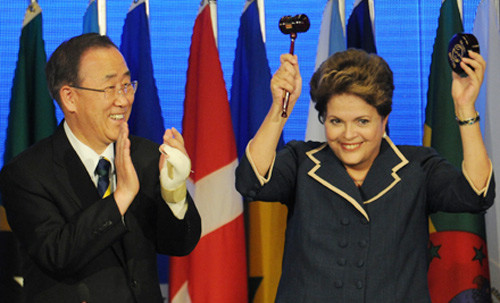|
 |
|
WRAPPING UP: UN Secretary General Ban Ki-moon and Brazilian President Dilma Rousseff at the closing ceremony of the Rio+20 UN Conference on Sustainable Development in Rio de Janeiro on June 22 (XINHUA/AFP) |
Rio+20, formally known as the UN Conference on Sustainable Development, ended in Rio de Janeiro on June 22 with the adoption of a 49-page resolution, titled The Future We Want. Widely seen as a product of compromise between the developed and developing worlds, the action plan is said to have at least kept alive the fond hope of future global sustainability endeavors.
The document "addressed the major concerns of all parties concerned, reflected the spirit of international cooperation, and showed the prospects of global sustainable development," commented Du Ying, head of the Chinese preparatory committee for Rio+20. Du is also vice chairman of the National Development and Reform Commission (NDRC), the top national economic planning agency in charge of overall sustainable development.
Chinese Premier Wen Jiabao attended Rio+20, together with 130 or so other world leaders. Wen pledged more efforts for national sustainable development and some $206 million worth of financial assistance for projects undertaken by the UN Environment Programme (UNEP), as well as sustainability programs in some least developed countries.
There was, however, tremendous despair and displeasure among many participants—especially NGOs—about the outcome of the conference as a whole, and a generally pessimistic outlook hung over the future course of global sustainable development.
Tough negotiations
Before it was passed at Rio+20, the final outcome document was intensively and tediously debated during three rounds of negotiations earlier this year, and it was finally agreed upon on the early afternoon of June 19, narrowly made ready for summit deliberations beginning the following morning.
The third round of negotiations, starting on June 13, was as difficult as the previous two rounds, and it failed to produce consensus on almost 70 percent of the drafted version by the June 16 deadline Rio+20 leaders had set.
To avert a possible dead end for Rio+20, Brazil, the host of the conference, assumed charge of the process of bringing up an acceptable final draft for all parties at the negotiation table. The Brazilian Government has "made special contributions to the successful conclusion of the agreement," said Chinese Assistant Foreign Minister Ma Zhaoxu.
According to Du of the NDRC, as the talks fell into deadlock, Premier Wen answered a call from Brazilian President Dilma Rousseff and expressly conveyed China's wishes for a successful conclusion of an agreement. Throughout negotiations, China closely coordinated and collaborated with Brazil, as well as other Group of 77 developing nations.
The North and the South expressed a number of major differences during the negotiations, particularly regarding the concept of "green economy," definitions of sustainable development goals, and the new institutional framework that should be created to implement future global sustainable development. The two camps also differed over the principle of "common but differentiated responsibilities." The principle, adopted at the 1992 UN Conference on Environment and Development, better known as the Rio Earth Summit, is regarded as a cornerstone for international cooperation.
At that landmark UN meeting, it was agreed by all parties that all countries have a common duty to protect the world environment, but they shoulder differentiated responsibilities because the developed North should play a leading role, due to their greater contributions to environmental deterioration over the centuries, as well as their higher economic status and greater wealth.
The principle was, however, challenged by developed nations. The United States, for instance, had made it clear until the final phase of the talks that it could not accept the concept and wanted to have the term deleted wherever it was mentioned in the draft. This was largely seen by the developing world as backtracking on the commitments the North made at the 1992 Rio Earth Summit to helping them implement sustainability measures through financial aid and technology transfers.
| 